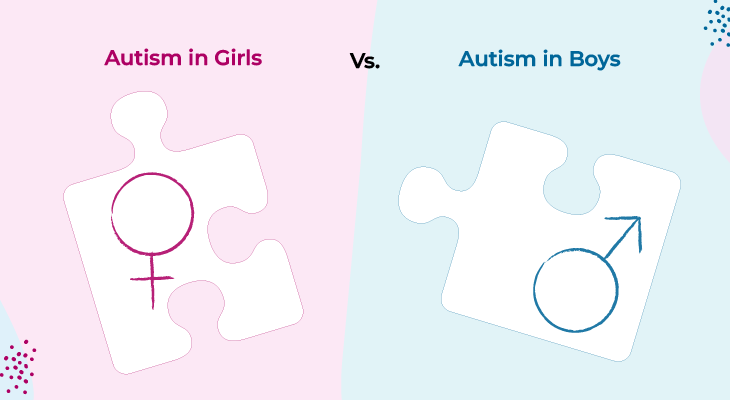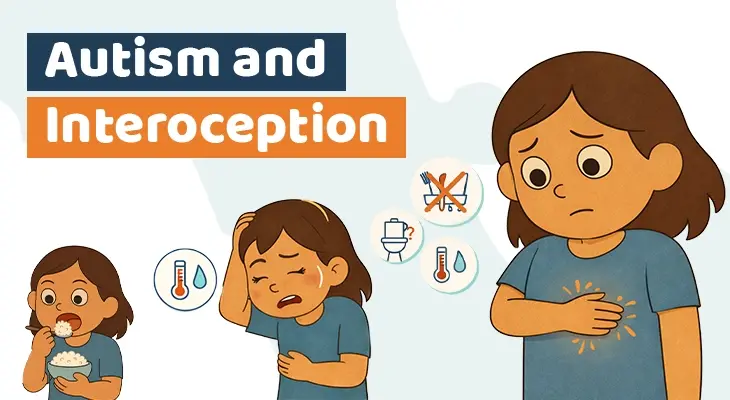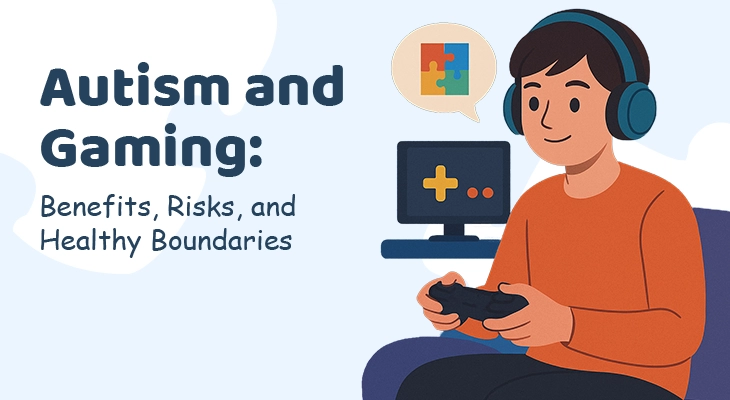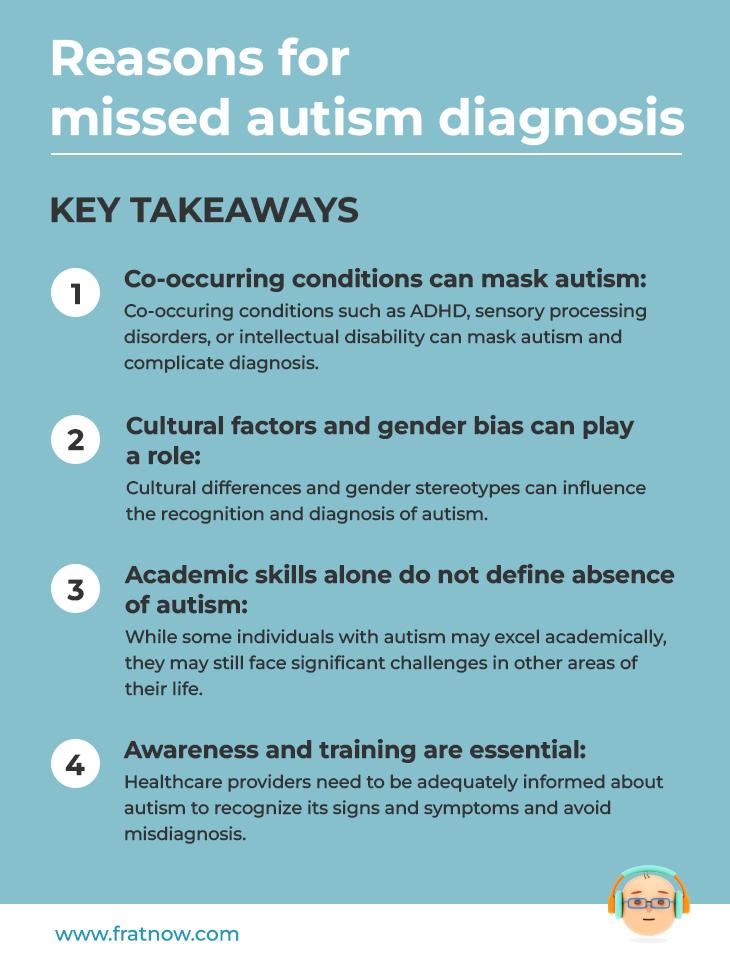
Download Download & share this Knowledge card in your network [Free Download]
What is a missed autism diagnosis?
Missed autism diagnosis refers to the failure to accurately identify autism spectrum disorder (ASD) in individuals who exhibit its characteristic symptoms. But why does this happen? To illustrate this point, let’s consider the following example.
When a person suspects they or a loved one has a disease, they typically seek medical attention. A doctor will often order lab tests to confirm or rule out the suspected condition. For instance, if someone suspects they have diabetes, a blood test can measure blood sugar levels to provide a definitive diagnosis.
However, autism is not a disease in the same sense. It’s a neurodevelopmental condition characterized by differences in brain structure and function. As such, it doesn’t have clear-cut biomarkers like many medical diseases. This can make diagnosis challenging and sometimes lead to delays or misdiagnosis. Read our blog “Developmental Delay vs Autism Spectrum Disorder (ASD): What first-time parents need to know” to help you better understand the key differences between developmental delays and ASD.
Unlike diseases with easily identifiable lab tests, autism diagnosis relies on a combination of behavioral observations, developmental assessments, and professional evaluations. This can make it more difficult to definitively pinpoint the condition, especially in early childhood when symptoms may be less pronounced. Read our blog “How do I know my child may be on the Autism Spectrum?” for a helpful guide to recognizing and understanding early signs of autism in children.
Understanding the reasons behind missed autism diagnoses is crucial for improving early identification and ensuring appropriate support for individuals with ASD. Let’s delve deeper into the factors that can contribute to delayed or inaccurate diagnosis.
Table of Contents
Early Misdiagnosis
Developmental milestones are crucial indicators of a child’s growth and development. When a child constantly misses these milestones, it can raise concerns among parents and healthcare providers. However, even when developmental delays are evident, autism diagnosis may still be missed. Here are some potential reasons why a child with missed developmental milestones might not be diagnosed with autism:
-
Lack Of Awareness Of Healthcare Professionals
One of the reasons for delayed autism diagnosis is a lack of awareness and understanding of the condition among healthcare professionals. Some healthcare providers may not have received sufficient training or education on autism during their medical training leading to misdiagnosis or delayed recognition. Read our blog “Early Intervention in Autism (ASD) – A Life-Changing Opportunity” to discover how early intervention programs can significantly impact your child’s development.
-
Cultural Factors In Family
The interpretation of social cues, such as eye contact, can vary significantly across cultures. In many Western cultures, maintaining eye contact is considered a sign of respect and engagement. However, in some Eastern cultures, direct eye contact may be seen as rude or disrespectful. This cultural difference can lead to misunderstandings and potentially delay the diagnosis of autism.
-
Gender Differences/ Diagnostic Bias
Girls with autism may be less likely to be diagnosed due to differences in symptom presentation and gender bias in diagnosis. Girls with autism may exhibit behaviors that are often associated with typical female development, such as an intense interest in princesses, celebrities, or fashion. The girl’s intense focus on these may be a form of hyperfixation, a common characteristic of autism. However, these behaviors can sometimes be misinterpreted as normal girlhood interests. Read our blog “Understanding Autism in Girls vs Boys” to learn how gender differences can influence the diagnosis and presentation of autism.
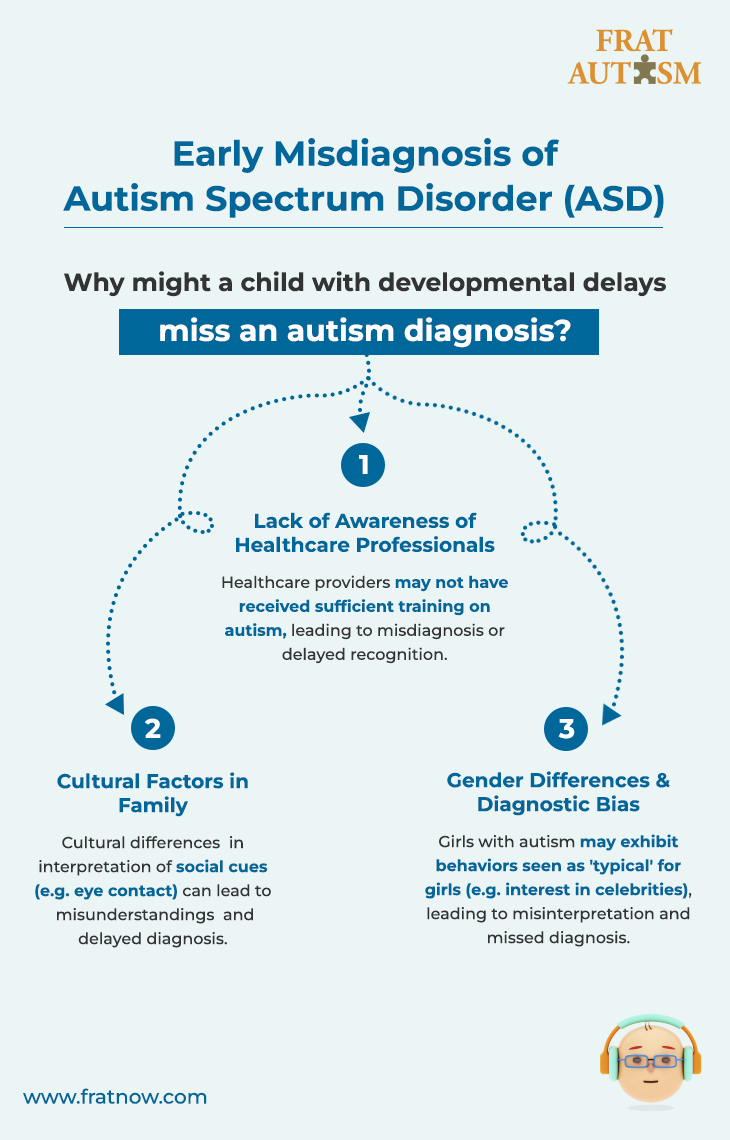
Download Download & share this infograph card in your network [Free Download]
Delayed Onset Of Autism Symptoms
On the other hand, some children with autism may not exhibit noticeable symptoms until later in childhood. This delayed onset can make early diagnosis challenging and may contribute to missed or delayed diagnoses. Milder symptoms or masking behavior could lead to a delayed diagnosis.
Co-Occuring Conditions Leading To Autism Misdiagnosis
Autism spectrum disorder (ASD) often co-occurs with other conditions, which can complicate diagnosis and lead to delays in identifying autism. These co-occurring conditions can mask autism symptoms or present with overlapping features, making it difficult to pinpoint the underlying diagnosis. Read our blog “Exploring Common Comorbidities in Autism” to understand how these additional conditions can influence the diagnosis and management of autism. Here are some common co-occurring conditions that can mask autism symptoms:
-
ADHD (Attention Deficit Hyperactivity Disorder) And Autism Misdiagnosis
ADHD and autism share many overlapping symptoms and can mask the underlying autism spectrum disorder. For example a child who exhibits symptoms of hyperactivity and impulsivity, such as difficulty staying seated, and interrupting others, might be initially diagnosed with ADHD without considering autism.
-
Intellectual Disability And Autism Misdiagnosis
A child with autism may struggle with tasks such as learning, problem-solving but they may not have the same level of difficulty understanding social cues typical for a child with autism. This presentation of a clear contrast between their cognitive abilities and their understanding of social cues, might lead to autism being misdiagnosed as intellectual disability.
-
Language Delays And Autism Misdiagnosis
While echolalia, which is the repetition of words or phrases a child has heard, is a common characteristic in autism, it can also be observed in children with language delays or other communication disorders. This can sometimes be mistaken for a language delay, leading to a missed autism diagnosis.
-
Sensory Processing Issues And Autism Misdiagnosis
A child with autism may exhibit sensory sensitivities or differences, which can affect their behavior and development. These sensory challenges can sometimes be misinterpreted as other conditions, leading to delayed or missed autism diagnoses.
A child with autism may have a strong aversion to loud noises. This hypersensitivity to sound can lead to anxiety, distress, and avoidance behaviors. If the child’s parents or healthcare providers are unaware of autism, they may attribute the child’s aversion to noise to a specific phobia or anxiety disorder, rather than recognizing it as a symptom of autism.
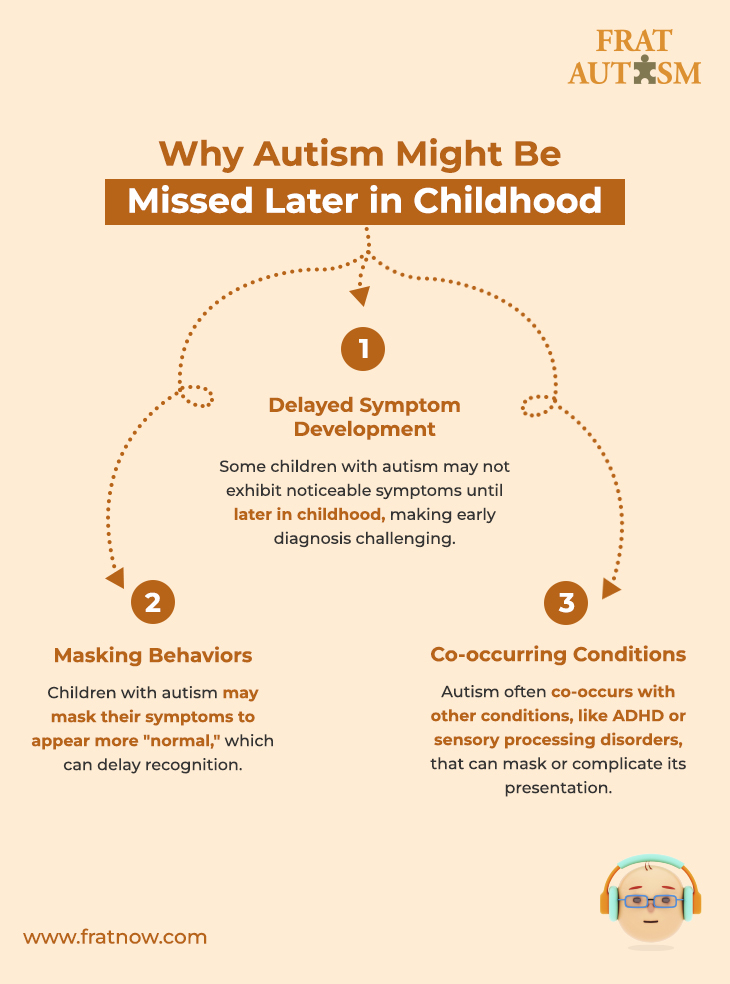
Download Download & share this infograph card in your network [Free Download]
Academic Skills And Delayed Autism Diagnosis
While academic skills can vary widely among individuals with autism spectrum disorder (ASD), some may demonstrate impressive abilities in certain areas, such as math or science. This can sometimes lead to a delayed or missed diagnosis, as their strengths may overshadow the challenges they face in other areas, like social interaction or communication.
For example, a child with autism who excels in math or science may be seen as a high-functioning student, without the full extent of their difficulties being recognized. However, as academic demands increase with age, these individuals may start to struggle with tasks that require complex problem-solving, critical thinking, or social collaboration.
These challenges, often attributed to personality traits or academic difficulties, may manifest as behavioral issues, such as meltdowns or withdrawal. The connection between these behaviors and autism may not be immediately apparent, leading to further delays in diagnosis. It’s important to remember that academic skills alone do not define a child’s overall development.
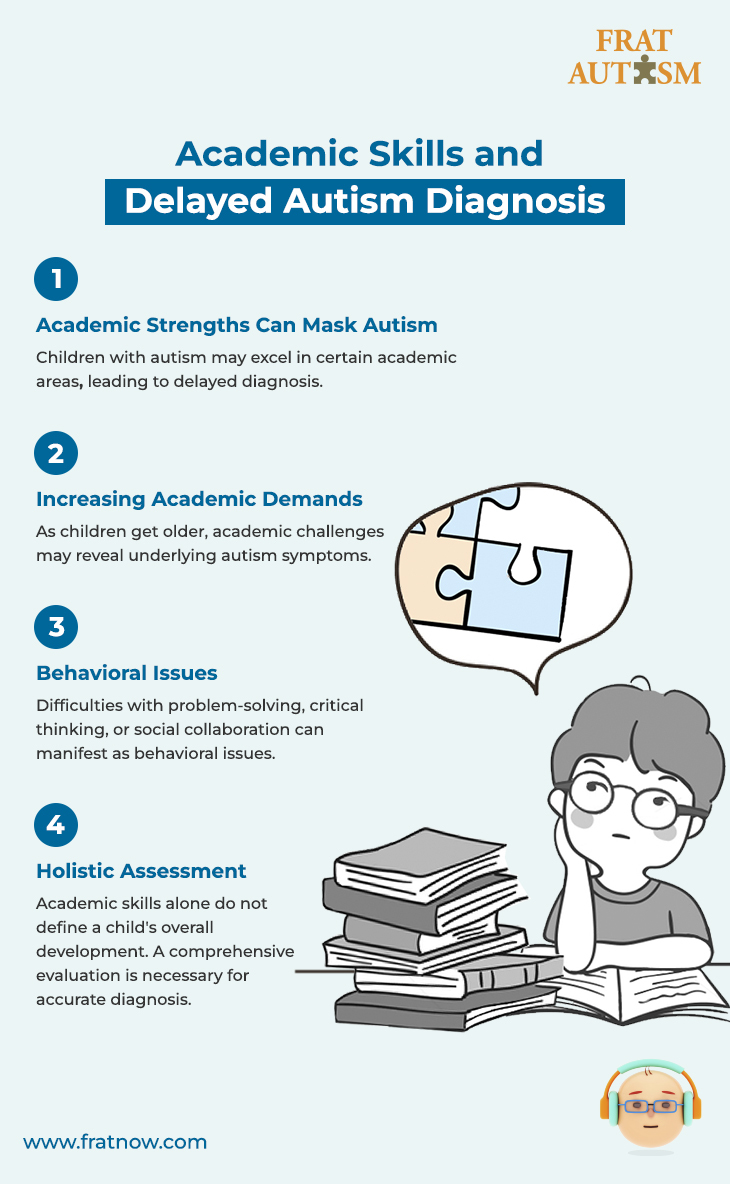
Download Download & share this infograph card in your network [Free Download]
Since you are reading this blog, you may also be interested in:
The Importance Of Early Intervention In Autism
Early intervention is crucial for individuals with autism spectrum disorder (ASD), especially when a diagnosis has been missed or delayed. Starting interventions as soon as possible can significantly improve outcomes and help children reach their full potential. Read our blog “Why is early intervention necessary in Autism?” to learn about the critical role timely intervention plays in supporting a child’s development and future outcomes.
- Brain plasticity: The human brain is most malleable during early childhood, making it an ideal time for interventions to address developmental challenges.
- Skill development: Early intervention can help children with autism develop essential skills, such as communication, social interaction, and self-care.
- Improved quality of life: Early intervention can lead to better long-term outcomes, including increased independence, improved social relationships, and higher quality of life.
- Reduced behavioral challenges: Addressing autism-related challenges early on can help prevent or reduce behavioral problems that may arise later in life.
- Personalized support: Early intervention programs can provide tailored support to address the specific needs of each child with autism.
The Frat® Test: A Potential Tool For Early Identification
The FRAT® test, which measures folate receptor autoantibodies (FRAs), can be a valuable tool in the early identification of autism spectrum disorder (ASD). Read our blog “What is FRAT® and the role FRAT® plays in Autism” to discover more about this tool and its importance in the early identification of autism. While not a definitive diagnostic test, it can provide valuable insights into potential underlying medical conditions that may contribute to autism symptoms.
Here’s how the FRAT® test can help:
- Identifying cerebral folate deficiency (CFD): The FRAT® test can identify CFD, a condition that can affect brain development and contribute to autism symptoms.
- Addressing underlying medical conditions: Early diagnosis of CFD allows for timely treatment (For example Supplementation of folic levels through Folinic Acid), which can potentially improve outcomes and reduce the severity of autism symptoms.
- Complementary to behavioral assessments: The FRAT® test can be used in conjunction with behavioral assessments to provide a more comprehensive understanding of a child’s development and challenges.
Conclusion
Even if a diagnosis is missed, there is still hope. By recognizing the potential for missed autism and understanding the importance of early intervention, we can empower parents, caregivers, and healthcare professionals to seek comprehensive evaluations and explore all possible avenues for supporting individuals with ASD.
The FRAT® Test offers a promising tool in the early identification process. While it’s not a definitive diagnostic test, it can provide valuable insights for further investigation and potential treatment options.
The most important message to remember? If you have concerns about your child’s development, talk to your doctor. Don’t wait for a formal diagnosis to start seeking support. Early action can make a world of difference.


